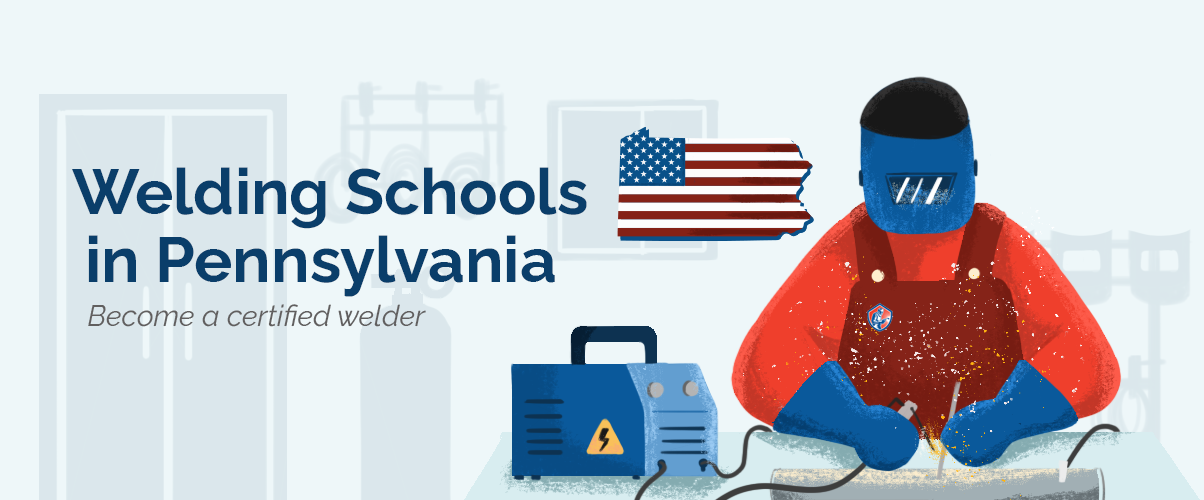One of the U.S. states with the highest employment level for welders and plenty of welding schools, Pennsylvania is a good place to start a welding career.
If you’re passionate about building and fixing things made of metal, learning how to correctly weld can help you start a lucrative and rewarding career.
What Does a Welder Do?
The short definition is that welder assemble pieces of metal together and repair damaged objects that are made of metal using machinery that emits high heat.
According to the Bureau of Labor Statistics(BLS), the biggest employer for welders, cutters, solderers, and brazers were metal manufacturers, specialty trade contractors, and repair and maintenance businesses.
Some welders start their own businesses after getting a few years of experience working in a shop or factory.
Read further to find out more about the welder’s job description, employment prospects, and training options.
Job Prospects
Employment for this profession is projected to grow by 3 percent from 2019 to 2029, with most job openings occurring on infrastructure repair and rebuild projects, according to BLS.
Welders who have completed post-secondary training and/or hold a certificate offered by the American Welding Society are expected to have the best employment prospects.
How to Become a Welder
Although some employers may hire welders with no formal education in the field and train them on the job, a diploma or certificate in the field will give you better prospects.
If you want to become a certified welder, there are several steps you need to follow:
- Get your high-school diploma or GED- many trade schools accept only candidates who have a high school diploma or equivalent but it’s best to double-check.
- Find the right training program
- Learn and practice for the welding certification testing offered by the American Welding Society
From trade schools to community colleges, there are many places where you can learn how to weld in Pennsylvania.
Although curriculum varies depending on the institution, a good welding school or apprenticeship program will usually teach you all the important skills you need in this career, such as:
- Reading and understanding blueprints
- How to weld metal parts, fix things, and fill holes using specialized equipment- depending on the school you choose you may learn one or more welding techniques.
- How to calculate the dimensions of the parts that will be welded together
- How to make sure that the welding is correctly done
- How to maintain the equipment
- How to follow safety procedures
Training programs last between 7 months and 2 years depending on the type of program and the curriculum.
Costs vary between less than $5,000 and more than $15,000 depending on the duration of the program and the type of credential it offers.
Some schools charge lower tuition rates for in-state students and it’s best to check all your options before deciding where to enroll.
In the table below we have compiled information about welding programs that are available in Pennsylvania.
To make sure that the program is recognized by employers in your area, you should also make sure that the program includes a significant portion of hands-on training and is accredited by government institutes.
40 Welding Schools In Pennsylvania
Employment Opportunities for Welders
As a welder in Pennsylvania, you can find employment in a variety of different fields, such as:
- Fabricated metal manufacturing
- Machinery manufacturing
- Fabricated metal product manufacturing
- Motor vehicle body and trailer manufacturing
- Foundation, structure, and building exterior contractors
- Ship and boat building
- Railroad rolling stock manufacturing
Welders in Pennsylvania
According to the Bureau of Labor Statistics, Pennsylvania is the state with the third-highest employment levels for welders, cutters, solderers, and brazers.
The average annual wage for workers in these professions in Pennsylvania was $46,870- a little higher than the national average.
The same source estimates the average annual wage reported across all occupations in Pennsylvania at $53,950.
Salaries for welders are also determined by their experience level, education, skills, the industry of employment, among other factors.
According to salary.com, the median annual wage for Pennsylvania welders with less than 3 years of experience is $43,242 as of April 2021- lower than the state average but salaries increase as welders become more experienced and earn additional certifications.
As an entry-level welder, you can make anywhere between less than $34,000 and more than $55,000.
Earning a post-secondary degree or certificate can help improve your starting salary.
The same report calculates the median annual salary for welders with 3-5 years of experience at $49,943 with wages ranging between less than $39,000 and more than $62,000 depending on other factors, including the industry of employment and the level of education.
Welders with 5-7 years of experience reportedly earn $60,482 on average.
The lowest 10 percent of experienced welders reportedly made less than $46,163 while the highest 10 percent made more than $78,433.
Salaries for welders vary widely depending on the city of employment and the local economy.
Salary.com estimates the annual salary reported by mid-level welders in Erie at less than $46,000 while those in Philadelphia made more than $53,000.
In conclusion, relocating to a different city may improve your earning prospects.
Annual Salary Range:| Item | Percent |
|---|---|
$33K | |
$49K | |
$78K |
Average Salary of Welders in Pennsylvania
| City Name | Salary |
|---|---|
| Philadelphia | $53,112 |
| Pittsburgh | $48,838 |
| Allentown | $49,968 |
| Erie | $45,799 |
| Reading | $49,322 |
| Scranton | $45,764 |
| Bethlehem | $49,968 |
| State College | $46,408 |
| Williamsport | $47,164 |
| York | $48,357 |















